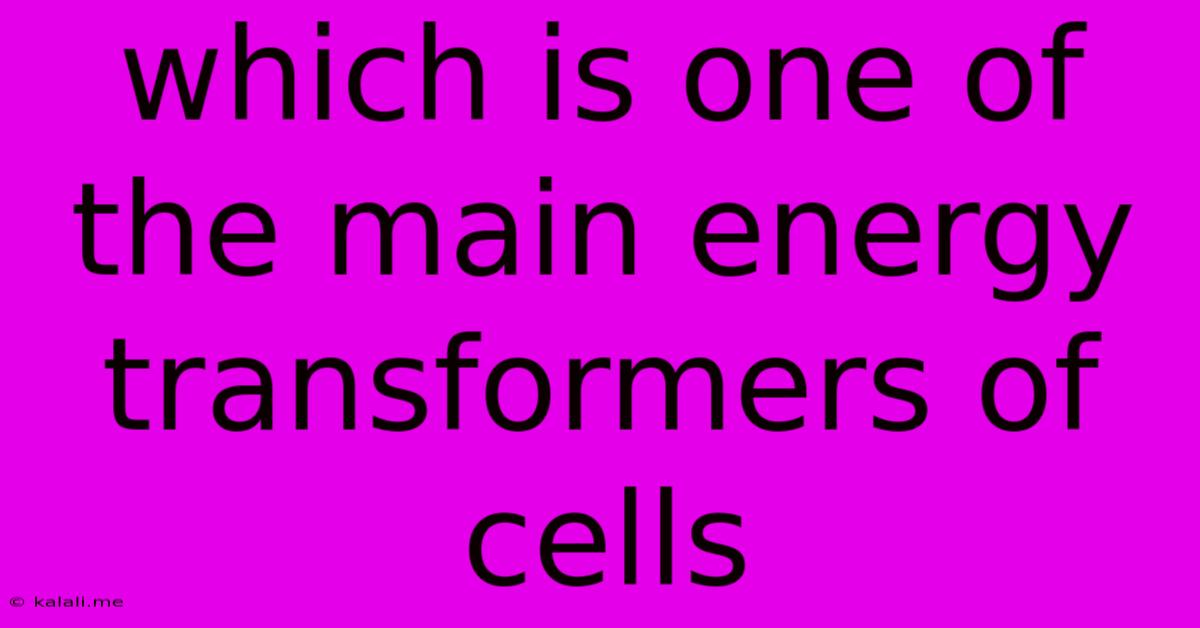Which Is One Of The Main Energy Transformers Of Cells
Kalali
Jun 16, 2025 · 3 min read

Table of Contents
Mitochondria: The Powerhouses of the Cell
Meta Description: Discover the crucial role of mitochondria, the main energy transformers of cells, in cellular respiration and ATP production. Learn about their structure, function, and importance for overall health.
Mitochondria are often referred to as the "powerhouses of the cell," and for good reason. These remarkable organelles are responsible for generating most of the chemical energy – in the form of ATP (adenosine triphosphate) – that fuels cellular processes. Understanding their function is key to understanding how cells, tissues, and ultimately, the entire organism, operates.
The Structure of Mitochondria
Mitochondria are double-membrane-bound organelles, meaning they possess two distinct lipid bilayer membranes: an outer membrane and an inner membrane. The inner membrane is highly folded into structures called cristae, significantly increasing the surface area available for the crucial processes of the electron transport chain and oxidative phosphorylation. The space within the inner membrane is known as the mitochondrial matrix, which houses the enzymes involved in the citric acid cycle (also known as the Krebs cycle).
Cellular Respiration: The Energy-Generating Process
Mitochondria are the central players in cellular respiration, a series of metabolic processes that convert nutrients into ATP. This process can be broadly divided into three main stages:
-
Glycolysis: This initial stage occurs in the cytoplasm and breaks down glucose into pyruvate. While not directly involving mitochondria, glycolysis provides the pyruvate needed for the subsequent mitochondrial stages.
-
Citric Acid Cycle (Krebs Cycle): Pyruvate enters the mitochondrial matrix where it is further broken down through a series of enzyme-catalyzed reactions. This cycle generates high-energy electron carriers (NADH and FADH2), carbon dioxide, and a small amount of ATP.
-
Oxidative Phosphorylation: This stage, taking place on the inner mitochondrial membrane, is where the bulk of ATP is produced. The high-energy electrons from NADH and FADH2 are passed along the electron transport chain, a series of protein complexes embedded in the cristae. This electron flow drives the pumping of protons (H+) across the inner membrane, creating a proton gradient. The subsequent flow of protons back across the membrane through ATP synthase generates ATP via chemiosmosis. Oxygen serves as the final electron acceptor in this process, forming water as a byproduct.
The Importance of Mitochondrial Function
The efficient functioning of mitochondria is vital for maintaining cellular health and overall organismal health. Dysfunction in mitochondrial processes can lead to a wide range of health problems, including:
- Mitochondrial diseases: These genetic disorders can affect various organs and systems, resulting in a range of symptoms depending on the specific mutation.
- Neurodegenerative diseases: Mitochondrial dysfunction is implicated in the development and progression of diseases like Alzheimer's and Parkinson's.
- Aging: A decline in mitochondrial function is considered a hallmark of aging, contributing to age-related decline in various tissues and organs.
- Cancer: Mitochondria play a complex role in cancer, both contributing to tumor growth and acting as targets for cancer therapies.
Conclusion
Mitochondria are undeniably essential organelles, playing a central role in energy production and maintaining cellular health. Their complex structure and intricate processes highlight the remarkable efficiency and sophistication of cellular machinery. Further research into mitochondrial biology continues to shed light on their critical role in health and disease, paving the way for potential therapeutic interventions for a variety of conditions. Understanding their function provides a crucial foundation for appreciating the fundamental principles of cellular biology and human physiology.
Latest Posts
Latest Posts
-
How To Create Clickable Image In Html
Jun 16, 2025
-
What Are The Factors Of 121
Jun 16, 2025
-
What Is A Theme Of The Passage
Jun 16, 2025
-
A Company That Provides Access To The Internet
Jun 16, 2025
-
Which Word Is Closest In Meaning To The Underlined Word
Jun 16, 2025
Related Post
Thank you for visiting our website which covers about Which Is One Of The Main Energy Transformers Of Cells . We hope the information provided has been useful to you. Feel free to contact us if you have any questions or need further assistance. See you next time and don't miss to bookmark.